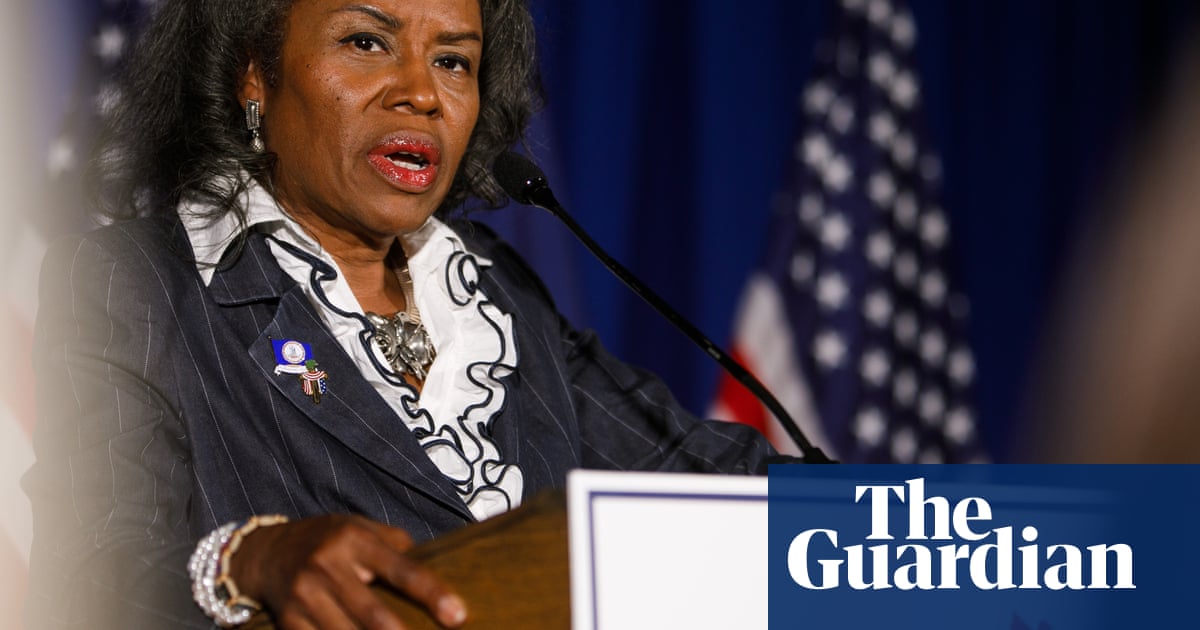The Republican nominee for governor ofVirginiahas recently tried to distance herself from her long-standing, hardline anti-abortion record, declining recently to state whether she would support any restrictions on abortion access if she is elected to lead the state this fall. But her record reveals a candidate staunchly opposed to the procedure.
Winsome Earle-Sears, now the state’s lieutenant governor, supported a 15-week abortion ban and has previously said she wants to make abortion illegal in almost all cases. In audio obtained by the Guardian, Earle-Sears also suggested an equivalence between consenting to sex and consenting to pregnancy.
Virginia is the only state in the US south without a strict abortion ban, and abortion is legal in the state through the end of the second trimester of pregnancy. The state’s current Republican governor, Glenn Youngkin,previously failedto build support for a 15-week abortion ban, a framework Earle-Searsendorsed. While campaigning for lieutenant governor in January 2021, beforeRoe v Wadewas overturned and support for abortion rights rose among the US public, Earle-Sears told a reporter that she considered abortion to be “genocide” and that she wanted to make abortion illegal in all cases unless the mother’s life was at risk.
But she has recently struck a different tone. In a local newsinterviewlast week, a reporter with WRIC 8News asked Earle-Sears about her past support for limiting abortion access. She replied: “I never said limiting access.” Sears, who is Black, then referenced abortion rates among Black women and asked: “Who doesn’t want us to have babies?”
When asked if she would sign a law banning abortion at 15 weeks or less, Earle-Sears said: “We’re not limiting access at all. That’s not what we’re saying. As a matter of fact, what we really need to do is get together and try to figure out, where is the limit?”
Virginians broadly support abortion rights, with71%saying abortion should be legal in all or most cases per a 2023 Public Religion Research Institute survey.
The interview comes as some GOP strategists told Politico that Earle-Sears isstruggling to make traction, citing slow fundraising and controversial comments connecting slavery to diversity, equity and inclusion programs. Her campaign wrote in a fundraising email: “Slaves did not die in the fields so that we could call ourselves victims now in 2025.”
Polling shows Earle-Sears trailing the Democratic nominee, former representative Abigail Spanberger, bynearly seven pointsaccording to polling averages. Virginia gubernatorial races often swing in theoppositedirection of the presidency.
Earle-Sears may be attempting to strike a softer tone on abortion in advance of the November election, but she has made hardline anti-abortion statements for years. In a little-noticed radio interview from June 2022, Earle-Sears suggested to then conservative radio host John Reid, now the Republicannominee for lieutenant governor, that women consenting to sex are consenting to pregnancy. “We need to make our choices before we’re pregnant, not, you know, after,” she said, just days after the supreme court overturned Roe. “You already made a choice.”
That comment was of a piece with other past statements. In September 2021, Earle-Sears said on Newsmax that shesupported a six-week abortion banlike the one that had just taken effect in Texas. Her campaign website’s“issues” pagepreviously included an anti-abortion section where she referred to “late-term abortion” as murder. (Abortion opponents use that term to refer to abortions later in pregnancy; in obstetrics, “late term” refers to a pregnancy after 40 weeks.) She scrubbed the site of that section in 2021.
Sign up toHeadlines US
Get the most important US headlines and highlights emailed direct to you every morning
after newsletter promotion
Most recently, Earle-Sears, who is required as the state’s senate president to add her signature to bills that pass the legislature, added a note to aconstitutional amendmentto codify abortion rights that the legislature passed in May. The Virginia Mercuryreportedthat she wrote above her signature: “I am morally opposed to this bill; no protection for the child.” The amendment must pass the legislature again next year before it can go to voters.
The Earle-Sears campaign declined to comment on the record on her recent interview as well as the 2022 interview.
Reid, the lieutenant governor nominee, has beenmired in his own scandalfor allegedly maintaining a social media account featuring photos of nude men. Governor Youngkinasked him to drop outof the race, but Reid, Virginia’s first openly gay candidate for statewide office, has denied connection to the photos and claimed that attempts to push him constitute discrimination against his sexual orientation.
Following news of the photos, Earle-Sears cancelled events with Reid. News also broke that, last year, she wrote a note on a marriage equality bill saying that she was “morally opposed” to same-sex marriage. Politicodescribedthe relationship between the two nominees at the Republican ticket as “frosty”.
